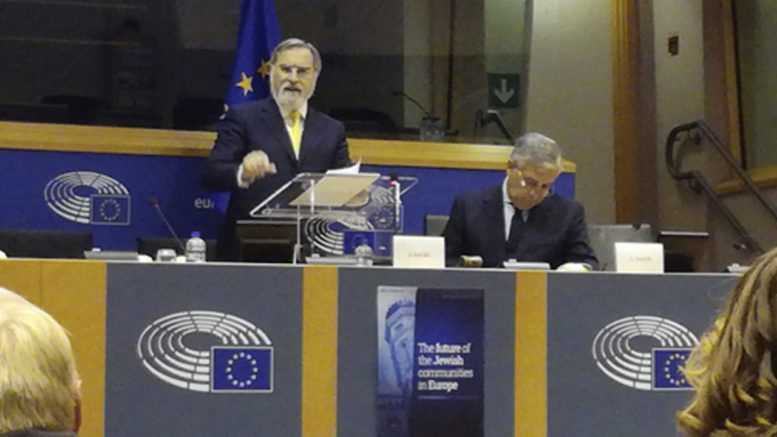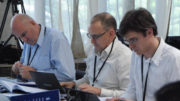Watch and read the speech given by Rabbi Lord Jonathan Sacks at the European Parliament on 27 Sept 2016 at a conference entitled “The Future of the Jewish communities in Europe”.
The hate that begins with Jews never ends with Jews. That is what I want us to understand today. It wasn’t Jews alone who suffered under Hitler. It wasn’t Jews alone who suffered under Stalin. It isn’t Jews alone who suffer under ISIS or al- Qaeda or Islamic Jihad.
We make a great mistake if we think anti-Semitism is a threat only to Jews. It is a threat, first and foremost, to Europe and to the freedoms it took centuries to achieve.
Anti-Semitism is not about Jews. It is about anti-Semites. It is about people who cannot accept responsibility for their own failures and have instead to blame someone else. Historically, if you were a Christian at the time of the Crusades, or a German after the First World War, and saw that the world hadn’t turned out the way you believed it would, you blamed the Jews. That is what is happening today. And I cannot begin to say how dangerous it is. Not just to Jews but to everyone who values freedom, compassion and humanity.
The appearance of anti-Semitism in a culture is the first symptom of a disease, the early warning sign of collective breakdown. If Europe allows anti-Semitism to flourish, that will be the beginning of the end of Europe. And what I want to do in these brief remarks is simply to analyze a phenomenon full of vagueness and ambiguity, because we need precision and understanding to know what anti-Semitism is, why it happens, why anti-Semites are convinced that they are not anti-Semitic.
First let me define anti-Semitism. Not liking Jews is not anti-Semitism. We all have people we don’t like. That’s OK; that’s human; it isn’t dangerous. Second, criticizing Israel is not anti-Semitism. I was recently talking to some schoolchildren and they asked me: is criticizing Israel anti-Semitism? I said No and I explained the difference.
I asked them: Do you believe you have a right to criticize the British government? They all put up their hands. Then I asked: Which of you believes that Britain has no right to exist? No one put up their hands. Now you know the difference, I said, and they all did.
Anti-Semitism means denying the right of Jews to exist collectively as Jews with the same rights as everyone else. It takes different forms in different ages. In the Middle Ages, Jews were hated because of their religion. In the nineteenth and early twentieth century they were hated because of their race. Today they are hated because of their nation state, the State of Israel.
It takes different forms but it remains the same thing: the view that Jews have no right to exist as free and equal human beings.
If there is one thing I and my contemporaries did not expect, it was that anti-Semitism would reappear in Europe within living memory of the Holocaust. The reason we did not expect it was that Europe had undertaken the greatest collective effort in all of history to ensure that the virus of anti-Semitism would never again infect the body politic. It was a magnificent effort of antiracist legislation, Holocaust education and interfaith dialogue. Yet anti-Semitism has returned despite everything.
On 27 January 2000, representatives of 46 governments from around the world gathered in Stockholm to issue a collective declaration of Holocaust remembrance and the continuing fight against anti-Semitism, racism and prejudice. Then came 9/11, and within days conspiracy theories were flooding the internet claiming it was the work of Israel and its secret service, the Mossad. In April 2002, on Passover, I was in Florence with a Jewish couple from Paris when they received a phone call from their son, saying, “Mum, Dad, it’s time to leave France. It’s not safe for us here anymore.”
In May 2007, in a private meeting here in Brussels, I told the three leaders of Europe at the time, Angela Merkel, President of the European Council, Jose Manuel Barroso, President of the European Commission, and Hans-Gert Pöttering, President of the European Parliament, that the Jews of Europe were beginning to ask whether there was a future for Jews in Europe.
That was more than nine years ago. Since then, things have become worse. Already in 2013, before some of the worst incidents, the European Union Agency for Fundamental Rights found that almost a third of Europe’s Jews were considering emigrating because of anti-Semitism. In France the figure was 46 percent; in Hungary 48 percent.
Do you stay in a country where your children need armed protection at school?
Let me ask you this. Whether you are Jewish or Christian, Muslim: would you stay in a country where you need armed police to guard you while you prayed? Where your children need armed guards to protect them at school? Where, if you wear a sign of your faith in public, you risk being abused or attacked? Where, when your children go to university, they are insulted and intimidated because of what is happening in some other part of the world? Where, when they present their own view of the situation they are howled down and silenced?
This is happening to Jews throughout Europe. In every single country of Europe, without exception, Jews are fearful for their or their children’s future. If this continues, Jews will continue to leave Europe, until, barring the frail and the elderly, Europe will finally have become judenrein.
How did this happen? It happened the way viruses always defeat the human immune system, namely, by mutating. The new anti-Semitism is different from the old anti-Semitism, in three ways. I’ve already mentioned one. Once Jews were hated because of their religion. Then they were hated because of their race. Now they are hated because of their nation state. The second difference is that the epicenter of the old anti-Semitism was Europe. Today it’s the Middle East and it is communicated globally by the new electronic media.
New justification for anti-Semitism is human rights
The third is particularly disturbing. Let me explain. It is easy to hate, but difficult publicly to justify hate. Throughout history, when people have sought to justify anti-Semitism, they have done so by recourse to the highest source of authority available within the culture. In the Middle Ages, it was religion.
So we had religious anti-Judaism. In post-Enlightenment Europe, it was science. So we had the twin foundations of Nazi ideology, Social Darwinism and the so-called Scientific Study of Race. Today the highest source of authority worldwide is human rights. That is why Israel — the only fully functioning democracy in the Middle East with a free press and independent judiciary — is regularly accused of the five cardinal sins against human rights: racism, apartheid, crimes against humanity, ethnic cleansing and attempted genocide.
The new anti-Semitism has mutated so that any practitioner of it can deny that he or she is an anti-Semite. After all, they’ll say, I’m not a racist. I have no problem with Jews or Judaism. I only have a problem with the State of Israel.
But in a world of 56 Muslim nations and 103 Christian ones, there is only one Jewish state, Israel, which constitutes one-quarter of one per cent of the land mass of the Middle East. Israel is the only one of the 193 member nations of the United Nations that has its right to exist regularly challenged, with one state, Iran, and many, many other groups, committed to its destruction.
Anti-Semitism means denying the right of Jews to exist as Jews with the same rights as everyone else. The form this takes today is anti-Zionism. Of course, there is a difference between Zionism and Judaism, and between Jews and Israelis, but this difference does not exist for the new anti-Semites themselves. It was Jews not Israelis who were murdered in terrorist attacks in Toulouse, Paris, Brussels and Copenhagen. Anti-Zionism is the anti-Semitism of our time.
In the Middle Ages Jews were accused of poisoning wells, spreading the plague, and killing Christian children to use their blood. In Nazi Germany they were accused of controlling both capitalist America and communist Russia. Today they are accused of running ISIS as well as America. All the old myths have been recycled, from the Blood Libel to the Protocols of the Elders of Zion. The cartoons that flood the Middle East are clones of those published in Der Stürmer one of the primary vehicles of Nazi propaganda between 1923 and 1945.
The ultimate weapon of the new anti-Semitism is dazzling in its simplicity. It goes like this. The Holocaust must never happen again. But Israelis are the new Nazis; the Palestinians are the new Jews; all Jews are Zionists. Therefore the real anti-Semites of our time are none other than the Jews themselves.
And these are not marginal views. They are widespread throughout the Muslim world, including communities in Europe, and they are slowly infecting the far left, the far right, academic circles, unions, and even some churches. Having cured itself of the virus of anti-Semitism, Europe is being reinfected by parts of the world that never went through the self-reckoning that Europe undertook once the facts of the Holocaust became known.
Anti-Semitism is a cognitive failure of groups
How do such absurdities come to be believed? This is a vast and complex subject, and I have written a book about it, but the simplest explanation is this. When bad things happen to a group, its members can ask one of two questions: “What did we do wrong?” or “Who did this to us?” The entire fate of the group will depend on which it chooses.
If it asks: “What did we do wrong?” it has begun the self-criticism essential to a free society. If it asks: “Who did this to us?” it has defined itself as a victim. It will then seek a scapegoat to blame for all its problems. Classically this has been the Jews.
Anti-Semitism is a form of cognitive failure, and it happens when groups feel that their world is spinning out of control. It began in the Middle Ages, when Christians saw that Islam had defeated them in places they regarded as their own, especially Jerusalem. That was when, in 1096, on their way to the Holy Land, the Crusaders stopped first to massacre Jewish communities in Northern Europe.
It was born in the Middle East in the 1920s with the collapse of the Ottoman Empire. Anti-Semitism re-emerged in Europe in the 1870s during a period of economic recession and resurgent nationalism. And it is re-appearing in Europe now for the same reasons: recession, nationalism, and a backlash against immigrants and other minorities. Anti-Semitism happens when the politics of hope gives way to the politics of fear, which quickly becomes the politics of hate.
This then reduces complex problems to simplicities. It divides the world into black and white, seeing all the fault on one side and all the victimhood on the other. It singles out one group among a hundred offenders for the blame. The argument is always the same. We are innocent; they are guilty. It follows that if we are to be free, they, the Jews or the state of Israel, must be destroyed. That is how the great crimes begin.
Jews were hated because they were different. They were the most conspicuous non-Christian minority in a Christian Europe. Today they are the most conspicuous non-Muslim presence in an Islamic Middle East. Anti-Semitism has always been about the inability of a group to make space for difference. No group that adopts it will ever, can ever, create a free society.
So I end where I began. The hate that begins with Jews never ends with Jews. Anti-Semitism is only secondarily about Jews. Primarily it is about the failure of groups to accept responsibility for their own failures, and to build their own future by their own endeavors.
No society that has fostered anti-Semitism has ever sustained liberty or human rights or religious freedom. Every society driven by hate begins by seeking to destroy its enemies, but ends by destroying itself.
Europe today is not fundamentally anti-Semitic. But it has allowed anti-Semitism to enter via the new electronic media.
It has failed to recognize that the new anti-Semitism is different from the old.
You know where the road ends – don’t go down there again
We are not today back in the 1930s. But we are coming close to 1879, when Wilhelm Marr founded the League of Anti-Semites in Germany; to 1886 when Édouard Drumont published La France Juive; and 1897 when Karl Lueger became Mayor of Vienna. These were key moments in the spread of anti-Semitism, and all we have to do today is to remember that what was said then about Jews is being said today about the Jewish state.
The history of Jews in Europe has not always been a happy one. Europe’s treatment of the Jews added certain words to the human vocabulary: disputation, forced conversion, inquisition, expulsion, auto da fe, ghetto, pogrom and Holocaust, words written in Jewish tears and Jewish blood. Yet for all that, Jews loved Europe and contributed to it some of its greatest scientists, writers, academics, musicians, shapers of the modern mind.
If Europe lets itself be dragged down that road again, this will be the story told in times to come. First they came for the Jews. Then for the Christians. Then for the gays. Then for the atheists. Until there was nothing left of Europe’s soul but a distant, fading memory.
Today I have tried to give voice to those who have no voice. I have spoken on behalf of the murdered Roma, Sinti, gays, dissidents, the mentally and physically handicapped, and a million and a half Jewish children murdered because of their grandparents’ religion. In their name, I say to you: You know where the road ends. Don’t go down there again.
You are the leaders of Europe. Its future is in your hands. If you do nothing, Jews will leave, European liberty will die, and there will be a moral stain on Europe’s name that all eternity will not erase.
Stop it now while there is still time.”Rabbi Lord Jonathan Sacks
– This speech was given at the European Parliament at a conference entitled “The Future of the Jewish communities in Europe” on 27 Sept 2016. This transcript was originally posted on his website and headings taken from the reprint at World Jewish Congress.

An international religious leader, philosopher, award-winning author and respected moral voice, Rabbi Lord Jonathan Sacks was recently named the winner of the 2016 Templeton Prize in recognition of his “exceptional contributions to affirming life’s spiritual dimension.” He served as British chief rabbi from 1991 to 2013.








